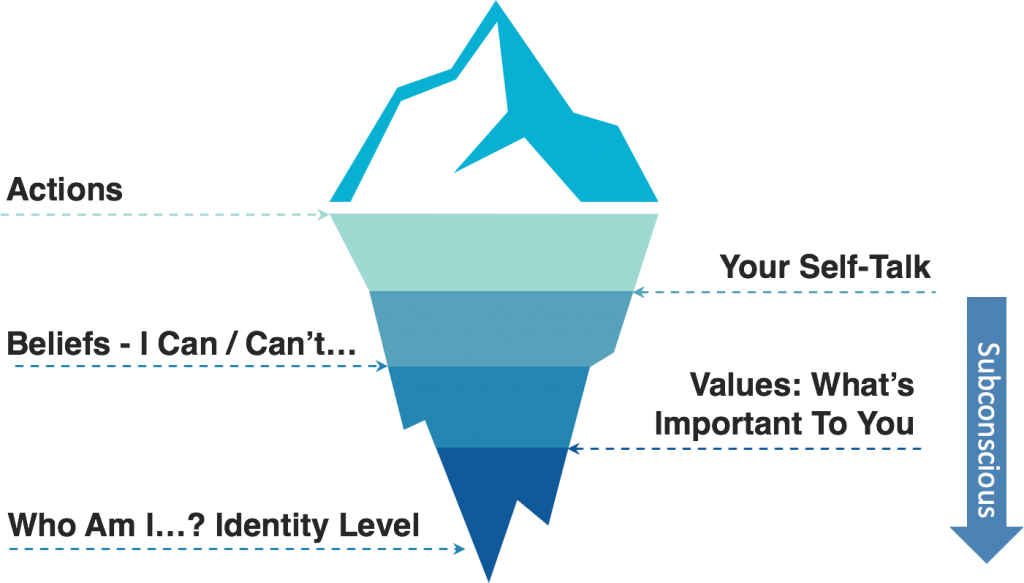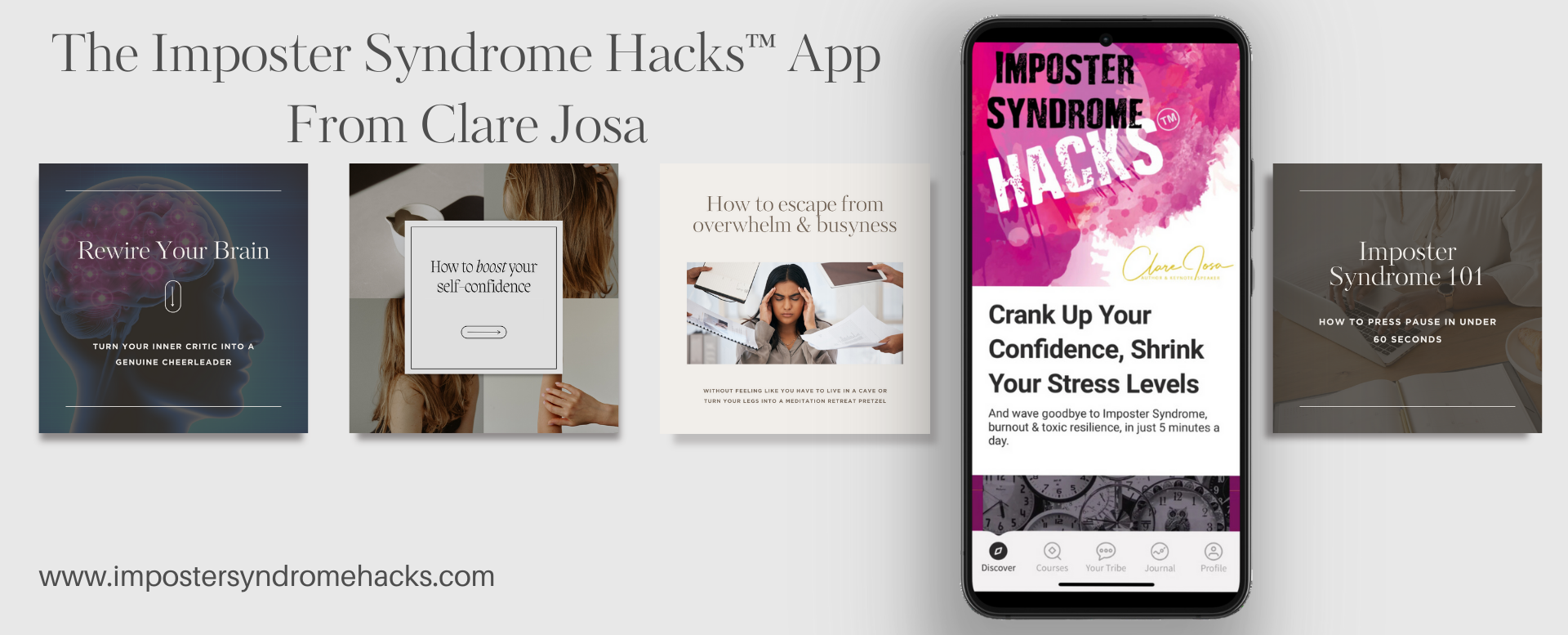The Imposter Syndrome Iceberg model helps us to understand why we get stuck with Imposter Syndrome, the role of our inner critic in getting us there, and why the mindset approaches we use for self-doubt don’t even touch the sides for Imposter Syndrome.
So many of us secretly wear our Imposter Syndrome like a ‘badge of honour’, making it part of who we are, not what we do, but what if the key to ditching Imposter Syndrome were about letting that go? How might things change for you if Imposter Syndrome were ‘just’ your Inner Critic on Steroids?
If you’ve hung out with me for a while, you’ll know I’m always talking about taming your Inner Critic. It’s that voice in your head that tells you all the bad stuff about who you are and what you can achieve.
It poops on your parade and squishes your most exciting dreams. It stopped you from asking out that dream date, way back when, and it’s the secret reason why we say no when our hearts are silently screaming yes.
But your Inner Critic has got your best interests at heart.
Yes, I’m ducking behind the screen right now to avoid the tantrums and rotten tomatoes that could be lobbed my way for saying that. The thing is that your Inner Critic’s biggest job is to protect you. I know it might not feel that way when our hearts are singing the song of something exciting and that voice in our heads is ranting about why it’s a crazy thing to do. But deep down, that mind-chatter is there because part of you is secretly scared and wants to keep you safe. And the actions we take depend on which voice wins.
One of your Inner Critic’s mantras is that safe is small and growth is scary.
It normally hangs out in the zone of your thoughts and actions, keeping check that you’re not taking risks it might not approve of or sticking your head above that parapet, where the wild things are.
When it comes to Imposter Syndrome, though, you’re no longer looking at thoughts and actions – it’s about who you believe you are and your existential fears. So your Inner Critic cranks things up to work with you to prevent an identity-level crisis.
Imposter Syndrome is basically your Inner Critic on steroids.
That’s why Imposter Syndrome wakes you up at 3am like no ‘simple’ worry ever could.
What do I mean about Imposter Syndrome being an ‘identity-level’ issue? Time for the Imposter Syndrome iceberg!
Think for a moment about the kinds of words we use when we’re talking to ourselves about Imposter Syndrome:
Who am I to do that?
What if they find me out?
What if they realise I am a fraud?
What if they spot that I don’t belong here?
So much of that self-talk vocabulary is about who we are, not what we do.
And when we’re talking to ourselves like that, it’s about how we see ourselves, as a person, not our thoughts or feelings or actions.
The Imposter Syndrome Iceberg

When we look at improving our performance, most training works at the ‘actions’ level – looking at what we do and how. That’s why so many business courses don’t work – because they are focusing on the surface level symptoms (the effects), rather than the underlying triggers (the causes). In the world of Imposter Syndrome, that is about us turning down opportunities to shine or brushing off praise, or turning into workaholic perfectionists.
What we do is just the surface level symptom, because it is triggered by the thoughts we think.
We have conscious thoughts – the ones we pick and engage with – and subconscious thoughts, which are like autopilot programmes in our brains. And that’s useful, because it’s why we wake up able to remember how to walk each morning, without thinking about it afresh.
These thought patterns are habits, wired into your brain. In the world of Imposter Syndrome, they’re the conversation we’re having with ourselves when the ‘who am I, to…’ trigger strikes.
But those thought habits are still just at the ‘effect’ level – symptoms of what is going on, below the surface.
Our thoughts are governed by what we believe about the world – and what’s important to us. This tells your brain what to pay attention to – in filters in your brain – hence seeing red cars everywhere if you buy one – and it’s pretty useful that you can function in daily life, without having to be consciously aware of the blood pressure in the big toe of your left foot.
With Imposter Syndrome, those beliefs might be that we only achieved what we have done so far by fluke – or luck – or timing. It might be that we believe success has to be hard work and that if it felt easy to us, then it was nothing special and so anyone can do it. We might be running a belief that everyone else has got their stuff together, so we feel isolated as the only person who struggles with Imposter Syndrome. And these mean your good ol’ brain will obey your filtering requests and show you more evidence to support this.
But what is really driving the show with Imposter Syndrome is how you see yourself.
This kind of person gets a pay rise, but I’m that kind of person, so I won’t ask for one.
It’s the difference between someone getting feedback on their behaviour versus who they are – the difference between ‘that was a bad thing to do’ and ‘you are a bad person’.
And that’s the level that Imposter Syndrome works at.
I had to work really hard on that project, so I am not good enough. That’s Imposter Syndrome.
We’re not saying we don’t have the skills or training to succeed. We’re are judging who we ‘really’ are and finding ourselves lacking. It’s an identity-level hit.
What The Imposter Syndrome Iceberg Is Telling Us
Going back to that thing about your Inner Critic’s job being to keep you safe, the deeper down that iceberg a trigger goes, the harder your Inner Critic’s team will work to protect you. So if you’re hanging around at the surface of the iceberg, looking at which actions to take, that negative self-talk doesn’t have to work so hard to persuade you to play small.
But if your triggers start to go deeper, reaching below the conscious surface, then your self-talk has to work harder, because it’s not just overcoming a few pesky actions or positive thoughts, it’s heading into the beliefs and values territory – what’s important to you about life.
And if those triggers hit the identity-level realm, it has to get the klaxons out, set off more fireworks than bonfire night and do everything it can to stand in your way.
Imposter Syndrome raises the stakes and cranks up your Inner Critic’s dialogue because the ‘keeping you safe’ gets cranked up to become an existential crisis.
The great news is that, although Imposter Syndrome can feel like having your Inner Critic on steroids, there is plenty you can do to tame your inner dialogue, without white-washing or pretending or fighting it. Knowing how to calm it down sets you free to handle the deeper triggers of Imposter Syndrome, so you don’t have to keep going round that roller coaster.
And by looking at where we are on the Imposter Syndrome Iceberg, it can help us to choose the strategies that will have the most impact, most easily, so we can finally set ourselves free from feeling like a fraud and make the difference we’re really here to make in the world.
Want the step-by-step how-to? It’s waiting for you in my book, Ditching Imposter Syndrome.
And I’d love to know:
How do you know when Imposter Syndrome is coming out to play? What are your early warning signs?
And how might it set you free to be more of who you really are, if Imposter Syndrome were ‘just’ your Inner Critic on steroids?
x Clare

